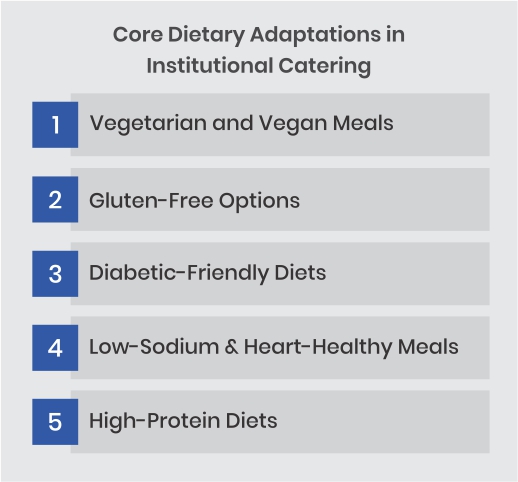Institutional catering in India is evolving to address diverse dietary requirements shaped by culture, religion, and health needs. Food catering service providers now deliver vegetarian, vegan, gluten-free, diabetic-friendly, and religious-specific meals at scale. By integrating technology, sustainability, and nutrition expertise, Food catering service providers in India ensure inclusivity, health, and productivity. This transformation highlights how institutional catering adapts to modern demands while respecting India’s diversity.
How Institutional Catering Adapts to Special Dietary Needs
Introduction
Institutional catering has become a cornerstone of modern workplaces, educational institutions, hospitals, and industrial facilities across India. With the rising demand for healthier and more personalized meal options, catering services have moved beyond standardized menus to accommodate diverse dietary needs. Today, Food Services in India is no longer just about filling plates, it’s about ensuring nutrition, inclusivity, and well-being for all.
In India, where cultural diversity, religious practices, and health concerns shape eating habits, Food Catering service providers must carefully design menus that balance tradition, nutrition, and convenience. Institutions expect Food Catering Services in India to adapt to vegetarian preferences, religious restrictions, medical diets, and global wellness trends—all while maintaining cost efficiency and large-scale service quality.
This blog explores how Food service providers in India are evolving to address special dietary requirements, ensuring that every individual gets food that not only nourishes but also respects their lifestyle and health needs.
1. The Rising Importance of Special Dietary Needs in India
India’s vast population represents a spectrum of dietary requirements. Catering services must adapt to factors such as:
- Cultural diversity: India has strong vegetarian traditions, especially among communities like Jains, Gujaratis, and certain South Indian states. Many avoid onion, garlic, or specific foods during religious occasions.
- Religious considerations: Muslims require halal-certified meals, Hindus avoid beef, and Sikhs often prefer vegetarian offerings in institutions.
- Health-driven needs: The rise of lifestyle diseases like diabetes, hypertension, and obesity has increased demand for low-sugar, low-salt, and low-fat diets.
- Wellness trends: Millennials and Gen Z employees are increasingly opting for vegan, gluten-free, and organic food options.
For Food Catering India, acknowledging and addressing these needs is no longer optional—it’s essential for employee satisfaction, institutional compliance, and overall productivity.
2. Institutional Catering in India: Scope and Scale
Institutional catering serves millions daily across sectors such as:
- Educational institutions: Schools and colleges require balanced nutrition for students.
- Healthcare facilities: Hospitals depend on specialized diets for patient recovery.
- Industrial catering: Large factories and plants serve thousands of employees daily, demanding efficiency and safety in meal planning.
- Corporate setups: Offices expect diverse menus catering to different employee demographics.
The scale of Industrial Catering India is massive. Some facilities prepare over 10,000 meals a day, and the challenge lies in maintaining consistent quality while adapting to multiple dietary requirements.
3. Core Dietary Adaptations in Institutional Catering

Vegetarian and Vegan Meals
Vegetarianism is deeply rooted in India. Institutional caterers ensure vegetarian-only kitchens or separate counters to respect religious sentiments. The growing vegan trend, though niche, has also led to plant-based meal options using soy, almond milk, and plant proteins.
Gluten-Free Options
With celiac disease awareness rising, many institutions now offer gluten-free staples like millet-based rotis, brown rice, and cornmeal alternatives. India’s indigenous grains like ragi, jowar, and bajra provide natural gluten-free solutions.
Diabetic-Friendly Diets
Hospitals and corporate catering demand low-glycemic index meals. Caterers incorporate foods like oats, whole grains, bitter gourd, and fenugreek while reducing refined sugar and white flour.
Religious-Specific Meals
- Halal-certified meat for Muslim employees.
- Satvik food (without onion, garlic, and root vegetables) during Hindu religious observances.
- Fasting-friendly menus during Navratri, Ramadan, or other festivals.
These adjustments show how Food Catering Services India tailor food beyond taste to meet spiritual, ethical, and medical requirements.
4. Technology and Innovation in Catering Services India
Adapting to special diets at scale requires innovation:
- Digital menu planning: Software helps design menus that meet calorie, nutrition, and allergen requirements.
- Customized ordering apps: Employees and students can pre-select meals based on their dietary restrictions.
- Automated kitchens: Industrial catering setups use modern machines to ensure portion control and hygienic cooking.
- Nutritional labeling: Institutions now demand calorie and allergen information displayed with meals for transparency.
Such practices make Food Services in India more efficient, transparent, and health-conscious.
5. Challenges in Implementing Special Diet Catering
While institutional catering is adapting rapidly, several challenges remain:
- Scale vs. customization: Preparing thousands of meals daily while maintaining dietary customization is a logistical challenge.
- Cost management: Specialized ingredients like quinoa, almond milk, or gluten-free flours increase costs.
- Awareness gap: Employees may not fully understand dietary needs, leading to mismatched expectations.
- Supply chain constraints: Sourcing certified halal meat, organic vegetables, or gluten-free products consistently can be difficult in remote areas.
- Training staff: Kitchen teams must be educated on cross-contamination risks and dietary compliance.
These challenges push Catering Services providers in India to innovate and partner with nutritionists, food technologists, and suppliers.
6. Case Examples from India
- Hospitals: Tertiary care hospitals in metros have nutrition departments that coordinate with caterers to serve low-salt, sugar-free, and renal diets.
- Schools: Mid-day meal programs are integrating iron and protein-rich foods to address malnutrition, while some private schools now serve allergen-free options.
- Industries: Large automobile and pharmaceutical plants demand round-the-clock meals, including diabetic-friendly and vegetarian options.
- Corporate offices: IT campuses in Bengaluru and Hyderabad offer multi-cuisine cafeterias where employees can filter meals by calorie count or diet type.
These examples highlight how Industrial Catering India adapts to client expectations across sectors.
7. ESG and Sustainability in Dietary Adaptations
Sustainability is reshaping Food Services in India. Special diets now go hand in hand with eco-friendly initiatives:
- Local sourcing: Using regional produce like millets not only supports farmers but also caters to gluten-free diets.
- Plant-based meals: Vegan diets align with lower carbon footprint goals.
- Waste reduction: Portion control and composting food waste complement dietary management.
- Reusable packaging: Eco-friendly serving methods ensure compliance with sustainability targets.
Thus, Food Catering in India contributes not just to health but also to environmental responsibility.
8. Future Trends in Institutional Catering in India
Looking ahead, Food Catering Services India will evolve in these directions:
- AI-driven personalization: Apps suggesting meals based on employee health data.
- Functional foods: Inclusion of probiotic yogurts, fortified grains, and immunity-boosting beverages.
- Global diets, Indian roots: Menus blending international diet trends with Indian staples (e.g., quinoa khichdi, vegan dosa).
- Greater focus on allergens: Clear labeling for nuts, dairy, gluten, and soy.
- Wellness-linked catering: Employers will integrate meal plans with workplace wellness initiatives.
The future of Catering Services India is not just about food but about holistic health management.
Conclusion
Institutional catering in India is undergoing a significant transformation. From accommodating religious sentiments to providing diabetic-friendly meals, Food Services in India has proven that large-scale operations can adapt to individual dietary needs.
For organizations, this evolution means improved employee satisfaction, reduced health risks, and higher productivity. For catering providers, it offers an opportunity to showcase innovation, inclusivity, and sustainability.
In a country as diverse as India, Food Catering India and Industrial Catering India are not just about feeding people-they are about respecting traditions, protecting health, and promoting well-being. By continuing to innovate and personalize, Food Catering Services in India will remain a vital partner in shaping healthier and more inclusive institutions across the nation.
Industries we serve:
Automobile | Ancillary | Manufacturing | Pharmaceutical | Healthcare | Oil and Gas | FMCG | Education | Real Estate | Commercial
Also read: The Impact of Industrial Food Catering on Employee Health

